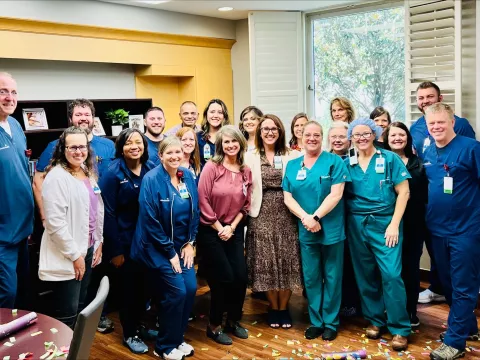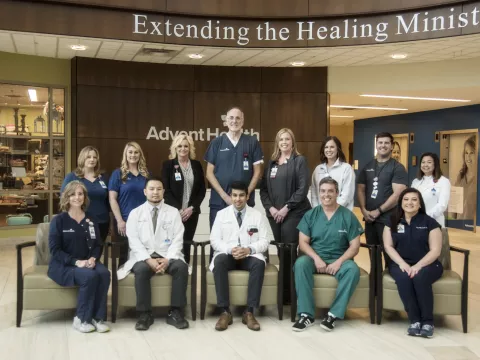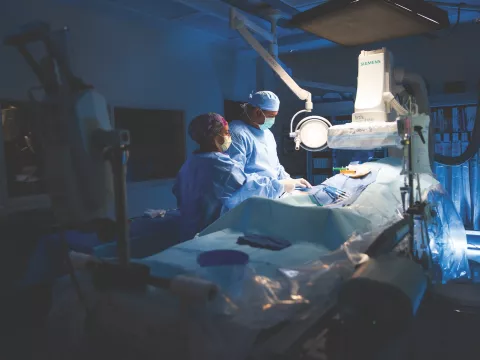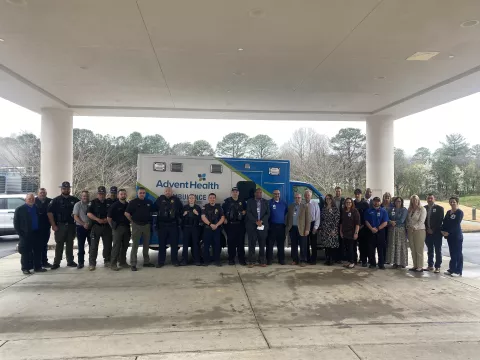- Chelsea Etheridge
Choose the health content that’s right for you, and get it delivered right in your inbox.

When Chatsworth resident Barry Gentry turned 60 in March, he had a new outlook on life to celebrate.
“I don't think I've been this healthy in 20 years,” said Barry Gentry, Chatsworth resident.
He credits a network of AdventHealth providers across Northwest Georgia with setting him on his path to healthier living after he experienced a series of ministrokes in late September 2023.
“On Sept. 27, I got up to go to the restroom around midnight, and when I laid back down, my face felt like it was numb, and my left arm went completely lifeless,” he said. “I knew in my head it was either a heart attack or a stroke, and I just began to pray.”
After a call to 911, paramedics arrived and quickly transported him to the AdventHealth Murray Emergency Department (ED).
“I had the luxury of living in a small community on my side,” he said. “I had time on my side. I live three minutes from AdventHealth Murray. The doctors and emergency team went right to work.”
As manager of the AdventHealth Murray ED, Drew Johnson, RN, said the emergency team activates specific protocols as soon as they are notified a potential stroke patient is enroute.
“We’re fortunate in Murray County that AdventHealth runs EMS also,” Johnson said. “They usually call ahead, and we can alert everyone that there’s a potential stroke patient coming in. The call goes out over the hospital announcement system as a code ‘stroke’ with the estimated arrival time.”
The alert system triggers CT scan technicians to ready the brain imaging equipment for the incoming patient, Johnson said. It also alerts the hospital’s emergency physician and nurses to meet the patient in an area of the ED dedicated to assessing their symptoms as soon as they arrive.
“The provider will start doing the exam and getting an EKG to make sure it’s not cardiac related,” Johnson said. “We’ll get an IV established and then go to the CAT scan. Our goal is less than 10 minutes from door to CAT scan.”
Gentry said the doctors quickly determined he had experienced a transient ischemic attack, or TIA, which can include stroke-like symptoms caused by a brief blockage of blood flow to the brain.
“They called it a ministroke,” he said. “It was not a stroke through a blood vessel or aneurysm type, thank God for that. In the emergency room, when I first heard the word ‘stroke’ out loud, I went into panic mode.”
But he praised the team at AdventHealth Murray for walking him through everything they were doing.
“I couldn’t get over the quality of customer service,” said Gentry. “Just seeing them be so communicative and transparent in saying, ‘We don’t know what’s going on, but we’re going to figure it out,’ was very comforting on my end.”
Donny Abraham, AdventHealth Murray vice president and administrator, said the team’s dedication to providing quality, compassionate care has led the hospital to being named an Acute Stroke Ready Hospital by The Joint Commission, a Leapfrog Group Top General Hospital and a PINC AI™ Top 100 Hospital.
“The secret sauce at AdventHealth is our team takes care of patients like family,” Abraham said. “The things we’re doing are because the patients we care for are the friends and families of the people who work here.”
Gentry, president and chief executive officer of the Murray County Chamber of Commerce, said he received prescriptions for high cholesterol and high blood pressure, met with a dietician for nutrition counseling and received a referral for a sleep study before being discharged.
Two days later, however, he was preparing for a chamber event when he felt tingling in his shoulder and arm and asked friends to bring him back to the ED.
“I didn’t want to risk anything,” he said. “By the time I got there, my blood pressure was off the chain.”
After new assessments, the AdventHealth Murray ED team made the decision to transport Gentry via ambulance to AdventHealth Gordon, a certified Primary Stroke Center by The Joint Commission, in nearby Calhoun. The emergency team there called for a telehealth consultation with a neurologist.
“While they’re still in the CAT scan room, almost always our physicians or our nurses are also calling a neurologist,” said AdventHealth Gordon’s ED Director Kevin Rodman, RN, BSN. “Historically, for acute strokes, telehealth works really well because the physician can get on the computer and evaluate the patient really quickly and make decisions.”
Clot-busting medications for patients experiencing an ischemic stroke in which blood flow must be quickly restored to the brain can only be administered within the first four hours of the onset of symptoms and the specialized equipment expedites treatment plans, Rodman said.
“It’s visualization through the computer with a really high-definition camera and they can zoom in where the only thing on the screen they can see is a person’s pupil,” he said. “They can do really refined assessments while they have the nurse doing things with the patient to see what impairments they may have.”
Where scans at AdventHealth Murray two days earlier had shown two ministrokes, Gentry said the scans at AdventHealth Gordon now showed four. The tele-neurologist prescribed a blood-thinning medication designed to prevent blood clots and discharged Gentry with a scheduled follow-up visit two days later.
The follow-up went well, and Gentry was also able to complete his sleep study at the AdventHealth Gordon Sleep Lab.
“I checked in and wow, (the technician) was so wonderful and made me feel right at home,” he said.
The sleep lab supervisor at AdventHealth Gordon, Stacey Holloway, RPSGT, CCSH, said the sleep rooms in the lab are outfitted with queen-sized beds with memory foam mattresses, fans, noise machines, televisions and private bathrooms.
“Our techs are excellent about making people feel comfortable,” she said. “We try to do everything we can to accommodate the patient.”
During the study, Gentry noticed a difference between the first half of the night when he slept without a CPAP (continuous positive airway pressure) mask and the second half of the night when he used the device.
“When I woke up, I had slept four hours straight without needing to get up to go to the restroom,” he said. “I’ve never done that in my adult life. I had slept at a very deep level uninterrupted.”
The sleep study confirmed Gentry had severe sleep apnea, a sleep disorder characterized by interrupted breathing during sleep and one of several sleep disorders that can be diagnosed in the AdventHealth Gordon Sleep Lab.
“Most of the time, we’re looking for sleep apnea, sleep interruptions, gasping and choking during sleep,” Holloway said. “Sleep is so intertwined with all the body systems from cardiology to endocrinology with diabetes, neurology and mental health. A lack of sleep, sleep deprivation or inefficient sleep is going to affect all those systems.”
Gentry’s sleep apnea diagnosis qualified him for a CPAP machine, which he said has helped him not feel the need for a mid-day nap anymore.
Since taking the blood-thinning medication, Gentry hasn’t experienced another ministroke, and he said his doctors are pleased with his lower blood pressure and weight loss, which he attributed to healthier eating habits and more exercise.
“I’ve lost over 50 pounds,” he said. “I don’t do it for vanity. I do it to stay out of the hospital.”
Gentry said he’s grateful, however, that AdventHealth Murray and AdventHealth Gordon are nearby should he need them again.
“If every hospital could have the customer service and communication and the humanity that I’ve experienced with AdventHealth Murray and AdventHealth Gordon, people would not dread going to the hospital as much,” he said. “Finding that quality here at home was so comforting. The care is just impeccable. They know what they’re doing, and they take good care of you.”
Recent News
AdventHealth Gordon is hosting the AngioScreen bus from 8 am to 3 pm, Tuesday, Dec. 10. The AngioScreen bus will be parked in front of Resource Building 3 on the campus of AdventHealth Gordon. An...
This past weekend, AdventHealth Gordon hosted a free lung cancer screening at the AdventHealth Harris Radiation Therapy Center, offering uninsured patients a critical opportunity for early detection...
AdventHealth Gordon joins a premier group of organizations that have received Pathway to Excellence® designation from the American Nurses Credentialing Center (ANCC).
Did you know one out of eight men will be diagnosed with prostate cancer in their lifetime? The American Cancer Society (ACS) informs us that prostate cancer is the most common cancer aside from skin...
The Baby Place Welcomes Two New Members of its Team
AdventHealth’s $30 May Mammogram Campaign brought in a total of 1,068 residents for mammograms within AdventHealth’s Georgia market, 329 of which were part of the 30 promotion. The others were covered...
For Men’s Health Month, it is important to spread awareness for prostate cancer prevention and health screening education.
The AdventHealth Harris Radiation Therapy Center at AdventHealth Gordon has been designated a Lung Cancer Screening Center by the American College of Radiology® (ACR®).
Corazon, Inc., a national leader in services for cardiovascular care, has granted accreditation to the Percutaneous Coronary Intervention (PCI) program at AdventHealth Gordon.
Your heart and its network of veins, arteries and capillaries work hard to help you live the life you choose. That’s why providing the best care for your heart and vascular health — from proactive...
AdventHealth Medical Group is pleased to announce the opening of AdventHealth Medical Group Cardiology at Dalton opening April 15. Appointments can be scheduled now by calling Call706-602-3215.
AdventHealth Gordon recently hosted a vehicle dedication for a new ambulance that will contribute to a fleet of nine EMS vehicles.












